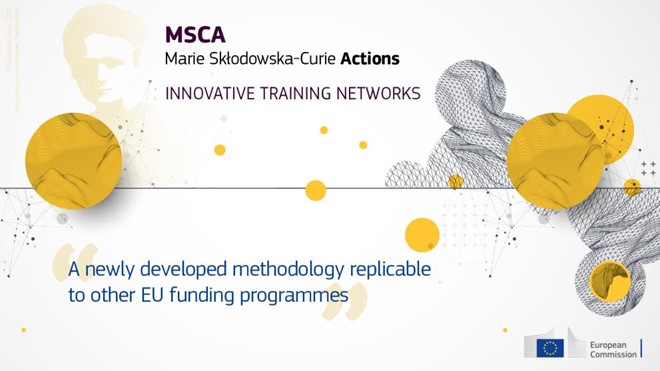The study on the Horizon 2020 ITN scheme further provides a framework for extracting and analysing innovative aspects in EU-funded projects, furnishing valuable insights and tools for policy-feedback activities and future EU programme enhancements.
The European Union (EU) is constantly seeking to enhance and valorise innovation to respond to the challenges of our era. Notably, and as presented in the recently published European Innovation Scoreboard, the EU has been improving its innovation performance year by year. For example, in 2022, the EU overtook Japan in its innovation performance and reduced the gap with other global competitors, such as Australia, Canada, South Korea and the United States.
A recently published and peer-reviewed study, conducted by the European Research Executive Agency (REA), in collaboration with the European Commission’s Directorate General for Education, Youth, Sport and Culture (DG EAC), analysed innovation aspects of Innovative Training Networks under Horizon 2020 (H2020-MSCA-ITN).
The Marie Skłodowska-Curie Actions (MSCA) ITN funding scheme, renamed Doctoral Networks under Horizon Europe (HE-MSCA-DN), aims to train a new generation of entrepreneurial and innovative early-stage researchers, able to face current and future challenges, and to convert knowledge and ideas into products and services for economic and social benefit.
Goals of the study
The main goals were to develop a practical methodology for tracking innovation in MSCA-ITN projects, to collect and present their most relevant elements, and draw conclusions and recommendations to further enhance innovation creation in future funding actions.
Methodology developed can be replicated by other EU funding programmes
It is worth noting that the methodological approach developed and tested by this study can be applied to other similar EU funding programmes. It does not only focus on usual innovation aspects (tangible innovation), but also on “non-tangible” ones and includes recommendations for applicants on the best project setup to bolster potential innovation. The study aligns with the New European Innovation Agenda, emphasising talent development and improved policymaking tools.
Methods used
Projects assessed were funded between 2014 and 2017, since most of the more recent projects are still ongoing. The researchers used three types of approaches for the study:
- A methodological approach, which combined quantitative analyses using innovation indicators from the literature and the EU’s Horizon 2020 Framework programme with qualitative data from surveys/questionnaires and the inspection of individual project reports. In addition, the Innovation Radar and the Horizon Results Booster (two internal tools for detecting, analysing and valorising innovative projects) were used. Finally, the validity of using most frequently found terms (“word clouds”) to analyse text content was tested.
- An analysis of innovations generated by MSCA-ITN projects, which relied on two main indicators, namely the number of patents and “innovations” as assessed by the Innovation Radar. Out of the 550 projects studied, and using those two innovation indicators, 118 projects were identified as having a high innovation output or high innovation potential.
- An analysis of the innovative features of the MSCA-ITN action itself, which examined features that are considered as “signature” principles for the MSCA. These included, innovative training practices on transferable skills, social innovation and working conditions, involvement of SMEs/Industry, supervision, networking opportunities, career development, long-lasting collaborations, synergies and policy-driven results. These were analysed through large-scale surveys and through the inspection of individual projects.
Conclusions and recommendations
The conclusions and results generated by the study confirm excellence in the research and innovation potential of the H2020-MSCA-ITN scheme, in line with the overall performance of Horizon 2020. They also provide important recommendations for policymakers and applicants, as well as points for improvement to enhance innovation and excellence across Europe and beyond.
- ‘Tangible’ innovation findings
The researchers’ findings suggest that beneficiaries from industry, especially those acting as project coordinators, are associated with the most innovative projects. Indeed, the study also found a higher proportion of Industrial Doctorates (MSCA-EID) among the most innovative projects. It is therefore crucial to continue efforts to promote and incentivise MSCA Industrial Doctorates.
Moreover, certain scientific domains (e.g., pharmacology, nanoscience, physics) encompassing ‘innovation intensive industries’ are more likely to produce patentable results. The researchers also suggest that beneficiaries with an already established track record in participation are more successful with regards to innovation output. Hence, it is recommended to include ‘Innovators’ in a project consortium, to optimise innovation generation. Furthermore, it is essential for policymakers to continue attract the non-academic sector into collaborative project consortia, to ensure successful innovation outcomes and impact.
The study also revealed that beneficiaries from Widening countries are significantly under-represented in the identified innovative projects. Under Horizon Europe, this is being addressed by an increased focus on capacity building and broadening participation in Widening countries.
- ‘Non-tangible’ innovation findings
The authors found that the innovative features of the MSCA-ITN scheme correlate with the tangible innovation outputs. This is more significant for social innovation (working conditions, health benefits, etc.), innovative training practices, SME/Industry involvement, networking opportunities for Early-Stage Researchers (ESRs) and synergy aspects.
MSCA fellows’ questionnaires also show how the Innovative Training Networks can enhance the employability of fellows, especially in finding research and innovation-related jobs. This demonstrates that the practices mandated or incentivised by the MSCA ITN’s design are likely to provide an ecosystem conducive to innovation.
To ensure successful innovation in project partnerships, the authors stress the importance of adhering to MSCA principles, such as innovative training, inter-sectoriality, and supervision.
This study is the first analysis proposing a methodology for tracking innovation in MSCA-ITN projects and similar EU-funded projects, showcasing the most relevant innovative elements therein. The newly developed methodology will be further refined to address certain limitations and optimise future tools.
Source: European Commission | European Research Executive Agency (https://shorturl.at/fhkOS)
